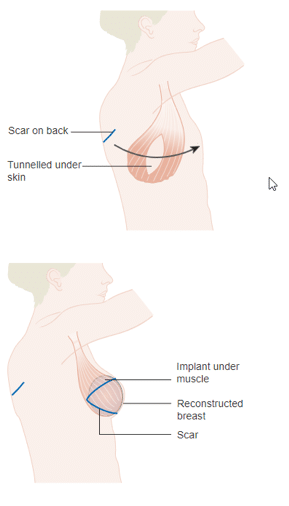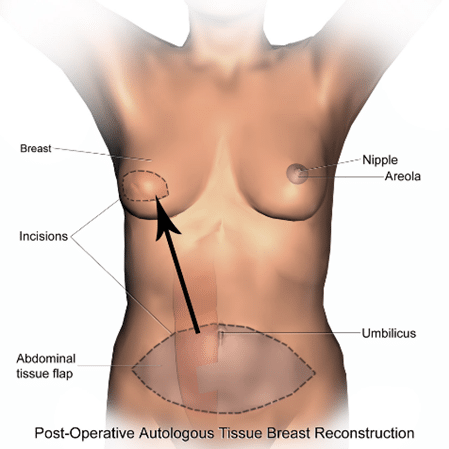Jan 06, 2020

There are two ways reconstruction with a tissue flap may be done: pedicle or free flap.
Pedicled flap – The flap remains attached at one end to its blood vessels and the rest of the flap is tunneled beneath the skin to the chest site.
Examples: TRAM (Transverse rectus abdominis muscle – abdomen); Latissimus dorsi (back)

Source:
https://commons.wikimedia.org
Free flap – The flap is completely detached from the body along with its blood vessels and reattached by microsurgery in the position of the reconstructed breast
Examples: TRAM (Transverse rectus abdominis muscle – abdomen); DIEP (Deep inferior epigastric perforator- abdomen); SIEA (Superficial inferior epigastric artery – abdomen); Gluteal (buttock)
In CPT there are five different codes that may be assigned for a breast reconstruction using an autologous flap. Free flaps are all grouped under 19364, regardless of the specific type of flap.
19364
Breast reconstruction with free flap
Pedicled autologous flaps are specific for the type of flap – either TRAM or latissimus dorsi.
19361
Breast reconstruction with latissimus dorsi flap, without prosthetic implant
19367
Breast reconstruction with transverse rectus abdominis myocutaneous flap (TRAM), single pedicle, including closure of donor site;
19368
with microvascular anastomosis (supercharging)
19369
Breast reconstruction with transverse rectus abdominis myocutaneous flap (TRAM), double pedicle, including closure of donor site
All the flap reconstruction codes include:
- Elevation and transfer of the flap
- Muscle dissection
- Closure of the donor site
- Breast contouring
Want to learn more? Purchase our Breast Reconstruction CPT Coding eBook.
References:
CPT Assistant, August 2005, Volume 15, Issue 8, pages 1-3
CPT Assistant, October 2000, Volume 10, Issue 10, pages 1-3
https://www.youtube.com/watch?v=iqKTBB0Lgmg (DIEP free flap procedure)
https://www.youtube.com/watch?v=onqiPSSuLuw (Pedicled TRAM flap procedure)
The information contained in this series is valid at the time of posting. Viewers are encouraged to research subsequent official guidance in the areas associated with the topic as they can change rapidly.
Subscribe to our Newsletter
Recent Blogs
Related blogs from Medical Coding Tips
CMS Hospital Compare is a public reporting pl...
Premier benchmarking is widely used by hospit...
PEPPER reports help U.S. hospitals identify o...
CMS has released the updates to the ICD-10-PC...
Subscribe
to our Newsletter
Weekly medical coding tips and coding education delivered directly to your inbox.





